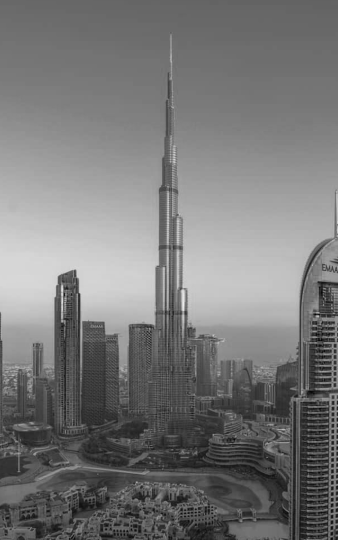
United Arab Emirates
The Emirati Real Estate Market evolved from a government-led, oil-funded initiative into a global investment destination. Marketing has played a pivotal role in positioning UAE properties as world-class assets, using innovation, storytelling, and technology to attract diverse buyers.
With Expo 2020, Golden Visa policies, and smart city visions like Dubai 2040 and Abu Dhabi Vision 2030, marketing in UAE real estate is no longer just a sales tool — it’s the engine of demand that continuously reshapes the skyline.
Growth & Transformation (2000–Present)
1. Overview of Growth (1990 – Today)
1990s: Foundation Years
• The UAE, especially Dubai and Abu Dhabi, began investing in infrastructure to diversify beyond oil.
• Real estate projects were primarily government-led.
• Freehold ownership for foreigners was not yet permitted.
2000s: Real Estate Boom
• 2002: Dubai allowed foreign property ownership, triggering a real estate boom.
• Emergence of mega-developments like Palm Jumeirah, Downtown Dubai, and Jumeirah Lakes Towers.
• Rapid urbanization, fueled by expats, investors, and tourism.
2010s: Market Maturity and Correction
• After the 2008 financial crisis, the market saw a correction.
• UAE introduced regulations, escrow laws, and RERA to increase investor confidence.
• Shift towards mid-income housing, sustainable communities, and mixed-use developments.
2020s: Post-COVID Recovery and Vision-Led Expansion
• Strong rebound post-COVID, with demand from global investors, digital nomads, and golden visa holders.
• Expo 2020 gave rise to Dubai South, District 2020 (now Expo City Dubai).
• Abu Dhabi saw major developments like Saadiyat Island, Yas Island, and Al Reem Island.
2. The Role of Real Estate Marketing
Marketing evolved from print-based listings to immersive digital ecosystems.
2000s: Traditional Marketing
• Reliance on newspapers, brochures, exhibitions (like Cityscape), and physical model displays.
Mid-2000s: Emergence of Branding
• Developers built powerful lifestyle-driven brands.
• Properties were marketed internationally with dedicated sales centers abroad.
2015 Onward: Rise of Digital Marketing
• Marketing became more data-driven, targeting international buyers with multilingual campaigns.
• Influencer marketing, content creation, and virtual tours became industry norms.
Today: Real Estate Marketing as Experience
• Digital storytelling dominates: people buy lifestyles, not units.
• Sales funnels integrate social media, CRM tools, WhatsApp automation, and personalized retargeting.
• Marketers have become strategic architects, influencing product design and positioning.
3. Leading Brands in the UAE Market
In Dubai
• Emaar Properties – Developer of Burj Khalifa, Dubai Mall, Downtown Dubai.
• Nakheel – Known for Palm Jumeirah, The World Islands, and Deira Islands.
• Dubai Properties, Meraas, Damac Properties, and Sobha Realty – known for upscale urban and beachfront projects.
In Abu Dhabi
• Aldar Properties – Leading developer with projects like Yas Acres, Mamsha Al Saadiyat.
• Bloom Holding and Imkan – Focus on wellness-centric and boutique communities.
These companies set benchmarks in luxury branding, integrated digital campaigns, and investor-focused communication.
4. Technological Innovations in Real Estate Marketing
The UAE is a regional leader in proptech integration and marketing innovation.
Virtual & Augmented Reality
• Virtual showings and AR apps to explore units remotely.
Artificial Intelligence & Big Data
• Predictive tools for buyer behavior, price forecasting, and ad targeting.
• AI chatbots and CRMs automate lead qualification and nurturing.
Blockchain & Smart Contracts
• Pilot programs for digital ownership records and secure transactions.
Digital Twins & Metaverse
• Developers like DAMAC and Emaar have ventured into metaverse real estate.
• Buyers can explore branded virtual communities before buying physical units.
360° Digital Marketing
• Advanced remarketing, dynamic content delivery, social listening, and influencer partnerships across global markets (India, China, Russia, Europe).

Government Entities Regulating Real Estate Marketing in the UAE
• Ministry of Economy
Oversees general economic policies and supports investment in the real estate sector, including marketing, through consumer protection laws and regulation of commercial advertising.
• Federal Tax Authority
Supervises the application of VAT on commercial properties and issues guidelines related to real estate transactions, which impact marketing strategies.
• Emirates Real Estate Corporation (EREC)
A federal entity focused on developing government-owned properties. It contributes to market regulation through partnerships with the private sector and enforces high standards in design and marketing.
Local Authorities Across the Emirates
Dubai
• Real Estate Regulatory Agency (RERA)
The regulatory arm of the Dubai Land Department (DLD), and the leading authority in real estate marketing regulation. It issues broker licenses, monitors advertisements, manages the "Ejari" system, and oversees the Dubai REST app.
Abu Dhabi
· Abu Dhabi Real Estate Centre (ADREC)
Established in 2023 under the supervision of the Department of Municipalities and Transport. It regulates the real estate market, including marketing activities, via the "Madmoon" platform, which verifies advertisements and enhances transparency.
Sharjah
· Sharjah Real Estate Registration Department
Regulates property sales and marketing, supervises real estate brokers, and issues commercial licenses in collaboration with the Department of Economic Development.






